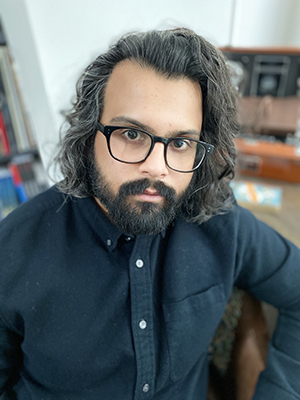Thresholds Between: Stephen Leckie in Conversation with Kulbir Saran

Kulbir Saran, whose poems "bottle rocket" and "unsaid" appear in The Malahat Review's winter 2019 Issue #209, discusses belonging, becoming, and blending time, reality, and fantasy in his Q&A with Malahat Review volunteer and past work study student Stephen Leckie. Read an excerpt from "bottle rocket."
Kulbir Saran is from Surrey, British Columbia. His poetry has appeared or is forthcoming in Spillway, Vallum, Abstract Magazine, Rhino Poetry, Eunoia Review, Isthmus Review, Carousel Magazine and Dime Show Review.
As I read these poems I am left with a fraught nostalgia for the time and place of these works. I wouldn't presume that the poems are completely biographical, but how do you relate to the poems' speakers? In what ways do you express your art as narrator, observer, and poet?
I like the term “fraught nostalgia,” it makes me think of trauma and the resultant surrealism in associated memories. Like a vintage dream, or nightmare.
When I’m writing a piece I often find myself propositioned by a rabbit hole of selves from different times/perspectives, some are mine and some are others. I’m never quite sure entirely who’ll end up speaking in the end. As I was discovering speakers for “unsaid” and “bottle rocket,” I tried to focus on the moments, and let the course of working the words reveal speaker(s) organically.
Most of my poems are quite long before I find the right voices and contract them. Often a work produces layers of speakers who are a blend of times, real and fantasy selves. This was the case for both “unsaid” and “bottle rocket.”
In "bottle rocket" there seems to be tensions between young and old and light and dark. What might these tensions elucidate in your process as a poet? Does the memory of that night spark other tensions? Is there an illegality to fireworks and explosives, “birthed to / hollow,” that figures into the groups' relationship with their community?
In “bottle rocket,” “heat” is intentionally vague and loaded. There is heat from within and from without. As a first-generation Indo-Canadian growing up in the 80s and 90s, I often felt torn between east and west, while simultaneously feeling like I belonged with neither.
I gravitated to kids like myself, whose own front doors were thresholds between those worlds. “bottle rocket” is a product of the friction and tearing. It’s rooted in isolation, resentment, naivety, inheritance, and abandonment.
Halloween, in hindsight, was this opportunity to exercise demons, become one for the night. It was a kind of birthplace, out from the void that existed between east and west. Releasing the monster chained in the basement, becoming the monster you believed the world was making of you.
At the time, I don’t think I thought of my behaviour as much more than starting shit and having laughs. The speaker(s) in “bottle rocket” come(s) from the perspectives of both reflection and real time.
I received "unsaid" as resounding with an interesting irony: the speaker recalls a particular time of thought and visual production, yet the poem itself, in its textual form, voices resolutely of the past left unspoken. How does your use of the second person allow the reader to embody the interaction between the speaker and the subject of the poem?
As a child of immigrant parents, I relied heavily on subtext as a form of communication, whether real or imagined. There were differences between the culture I was being raised in and the one my parents came from, whether in values, language, expression, intention.
My parents sacrificed much of themselves, and each other, to protect and provide for our family, and their physical stresses took emotional tolls. As a child, I often spoke with fantasy versions of them in response to personal struggles and conflicts because I felt there wasn’t a conduit for those kinds of conversations.
There is a conversation with both a real and fantasy subject by both a real and fantasy self in “unsaid.” They kind of happen at the same time, a real conversation and an expanded imaginary one.
It’s an ironic and paradoxical way to attempt reconciliation. As close to being real without being, an adult using a childhood coping mechanism to respond in fantasy to a comment made in real life about the past. A realization that the comment was connected to another more traumatizing memory, and by “reading between lines,” the adult attempts to construct a path to reconciliation in the only way they know how.
You have other poems forthcoming in various journals. Did you have a process for submitting "bottle rocket" and "unsaid" for The Malahat Review? Are you selective in your submissions to particular publications? Do you have any advice for writers who might have challenges getting their work out there?
When I submitted to The Malahat Review, my criteria for selection was that the pieces had my best in them. They just needed to feel right, authentic. It’s a subjective, instinctive, emotional method. I submit to publications that I admire, and I just try and give them my best work.
For a long time, I struggled to find a path. But with each rejection, I had an opportunity to revisit my work, question, revise, test. A bit of scientific method.
For writers having challenges getting their work out there, the only part you control is the work before you submit and after you receive a response. Try to be as thoughtful and critical as you can of your work during those parts. For poetry, every word, space, break counts. Ask why more often than what. Be as concerned with receiving your work as giving it. Reflect when the submission comes back, be objective, adapt, then persist. Anticipate rejection despite your efforts, try not to dwell.
Love your work, hate it, swear it off and come crawling back. Allow yourself and the work to breathe during those times, space helps perspective. Be honest with yourself and with your work, it’s a living thing. Believe, fail, kill, resurrect, repeat. Lastly, your path is yours, and this has been mine. Some, none, or most of this may apply.
As a reader of your poems, I returned again to unpack more from the register of your words. How do you settle on the final poem from the larger beginning work? Are there other authors that inspire you, demand through their diction that you return to their works? Who are you reading right now?
For me it’s kind of like sorting a hoard. I bring everything into the room and start separating into piles. Eventually one of the piles conjures something and I forget about the garage sale. I’m messy with the rough work, and throw everything at it, every speaker that has something to say gets heard.
Eventually a line will connect with that one I was thinking about on the drive home from work, and often there’s one line from somewhere that starts it all. I spend a lot of time digging for a strong connection to that first line (which may or may not be the first in the poem, may be the last, or middle). The connection needs to be something complementary, or juxtaposed but fluid, and once they’re locked, there’s a new pile. Next I bring out the garbage bags, pull any parts I liked from the other piles and throw the rest out. What’s left gets the finer tools, is often expanded and contracted a bit, but far less messy.
Although I read most evenings, I’m listening to music throughout the majority of the day, so I’d have to say I return to songwriters. I enjoy most genres of music, but find folk/blues tend to be the main roster of songwriters that I am returning to, studying, and being inspired by. Songwriters like Woody Guthrie, B.B. King, Townes Van Zandt, Sixto Rodriguez, and Bob Dylan are all high repeats.
I reread Animal Farm and 1984 most recently, and have been thinking a lot lately about how foretelling George Orwell books are. I enjoy film, and still think about Mississippi Grind (2015) a lot, I’ve re-watched that film a bunch over the past few years. I tend to like layered works, where you can take as little or as much as you can imagine from them.

Stephen Leckie
* * * * * * * *









